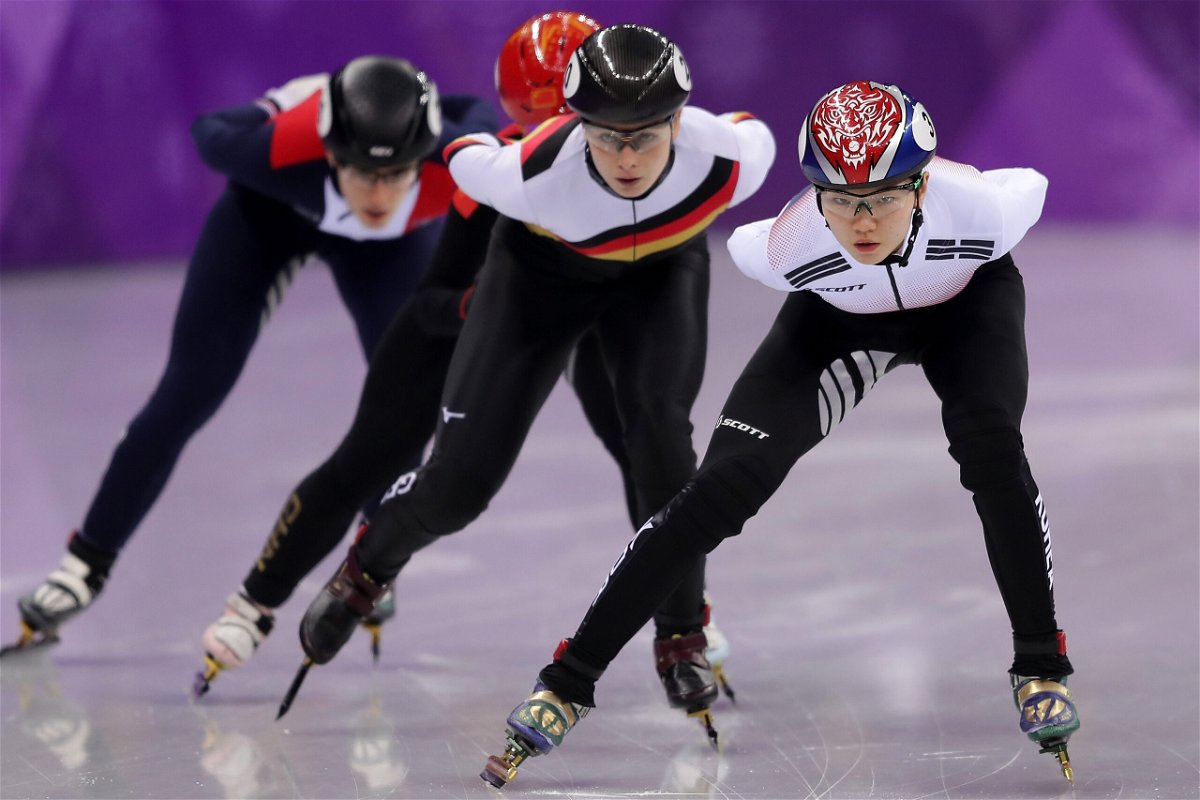How double Olympic gold medalist Shim Suk-hee lost the race to overturn her ban ahead of Beijing 2022

Shim leading the pack during the Ladies Short Track 1
By Gawon Bae, CNN
At the 2014 and 2018 Winter Olympics, South Korean speed skater Shim Suk-hee stepped onto the podium with her teammates for gold medals — the crowning moments of her sporting career.
Fast-forward to 2022, and things have drastically changed for Shim ahead of next month’s Winter Olympics in Beijing.
The short-track speed skater was barred from training in October last year after a series of text messages she sent were leaked, causing controversy in her native country.
After two months of investigations, a Korea Skating Union (KSU) committee announced December 21 it was suspending Shim from the national team for two months, saying she had “marred the dignity of athletes.”
The suspension meant the two-time Olympic gold medalist would not be able to compete in the Beijing Winter Games, which are set to begin on February 4.
To overturn the suspension, Shim had the option of appealing to the Korean Sport & Olympic Committee’s (KSOC) Sports Fair Play Committee or taking the case to court.
It all began in October 2021, when Shim’s text messages with a former national women’s skating coach were leaked. In the messages, Shim mocked her teammates and discussed making a “Bradbury,” raising suspicions of race fixing.
At the 2002 Winter Olympics, Australian speed skater Steven Bradbury, an underdog in the 1,000-meter short-track final, was in last place until the final lap, when his fellow racers crashed together and he sailed across the finish line, taking the gold medal.
In December, KSU’s investigation committee also looked into a collision between Shim and her teammate Choi Min-jeong during the 1,000-meter final in Pyeongchang four years ago and concluded that Shim had intentionally used her right arm to push Choi’s left arm during the race.
The committee, however, did not officially conclude the charge of race fixing as there was no evidence to prove Shim’s intentions.
The KSU’s Fair Play Committee, which administers discipline, later suspended Shim for two months for “marring the dignity of athletes” as she admitted to disparaging her teammates in a series of text messages.
Duty of keeping dignity and illegal leaking of texts
As part of her appeal to compete in Beijing, Shim filed an injunction to lift the two-month ban in January, but the Seoul Eastern District Court dismissed the request on January 18.
The court ruled that she had violated a national athlete’s duty to maintain dignity with her text messages, since the exchanges were sent during the Winter Olympics when Shim represented South Korea, a KSU official said in a statement.
Shim’s legal representative, who is unauthorized to speak on the record, told CNN that they had argued in court whether it was fair to include the content of personal text messages in the duty of a national athlete to maintain dignity.
Her side also claimed the text messages were illegally leaked to the media by former coach Cho Jae-beom, who had been found guilty and sentenced to a 13-year prison term for the rape and sexual assault of Shim.
Shim’s representative said they told the court that the personal messages being leaked allegedly by Cho amounted to a “secondary victimization” of Shim.
The KSU countered that the “strict rule of evidence” does not apply to civil proceedings and that the two-month suspension is the result of the union’s investigation; Shim had already publicly admitted to — and apologized for — mocking her teammates.
“The text messages were exchanged with the assumption that they would not be made public, but then were leaked by other [Cho]’s criminal act,” Shim’s representative said.
Excessive punishment, legal representative says
Shim’s representative also claimed the two-month suspension was excessive as she had already been dropped from the national team in October and could not compete in the International Skating Union World Cup in November.
They said the KSU did not reflect the “penalty” from October when discussing a separate, two-month suspension in December.
However, the KSU denied that it had issued a double punishment, claiming that separating Shim from the rest of the team was “not a disciplinary measure.”
In October, a KSU official told CNN that they separated Shim from the squad as it could be “difficult [for Shim and the national team] to stay and train together” as her leaked text messages would affect the team dynamic and citing the need for an investigation.
Despite finishing first at the national Olympic trials in May, Shim can no longer dream of competing in Beijing, which would have been her third Winter Games.
Her legal representative told CNN that there are no plans to appeal as the court procedure takes time, and any decision would be unlikely to come before the Olympics begin in a few weeks and the two-month suspension ends on February 20.
Without Shim, South Korea still managed to secure five spots for women’s short-track speed skating in Beijing. The KSU submitted its Olympic entrants — Choi Min-jeong, Lee Yu-bin, Kim A-lang, Seo Whi-min and Park Ji-yun — to the Korean Sports and Olympic Committee on January 24.
The-CNN-Wire
™ & © 2022 Cable News Network, Inc., a WarnerMedia Company. All rights reserved.